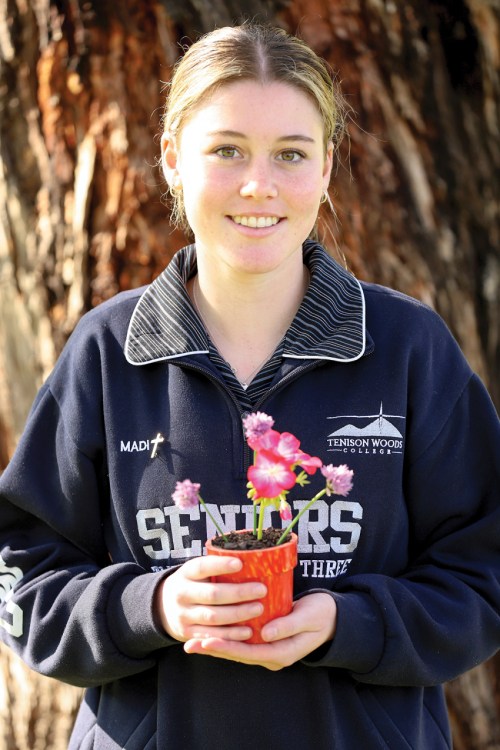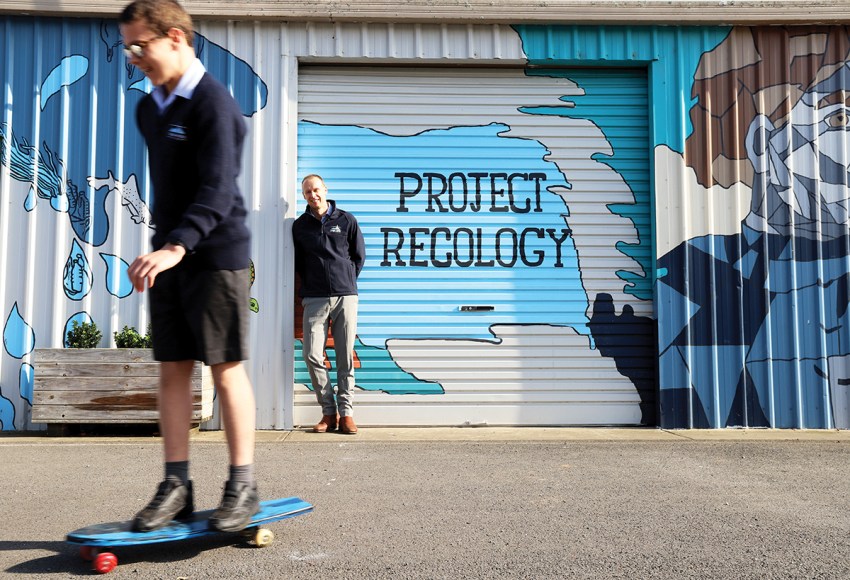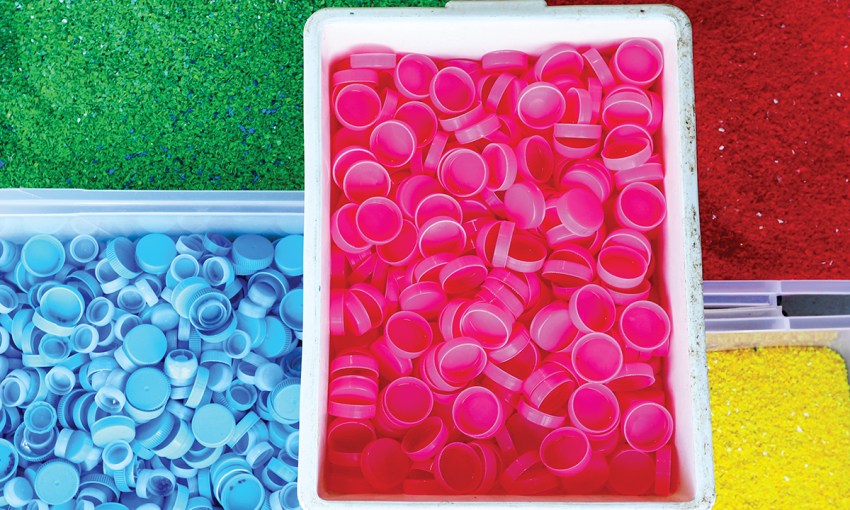In a corner pocket of Tenison Woods College, a teacher and his students are creating positive change … along with an almighty smell.
What a load of rubbish
It’s a typical Wednesday morning and there’s a particularly atypical smell emanating from a corner of Mount Gambier’s Tenison Woods College, known to students as the “Project Recology” centre.
Some describe this smell as “earthy”, others might say “stinky”, but everyone’s in agreeance that it’s hugely productive.
Project Recology is a shed-type building covered in blue and white artwork that disguises the industrial-sized composter inside: waste goes in, sustainability comes out.
“You get used to the smell,” says the college’s sustainability coordinator Tom Linnell, as he explains that the industrial composter – which processes up to 50 kilograms of food waste a day – saves the college from dumping around 10 tonnes of waste into landfill annually.
“Not only does it remove (the waste) but it turns it into a resource that can be used as a saleable product (for example organic fertiliser) for kids to learn about economics, business and future job pathways,” he explains.
Regular bin audits, recycling and composting are among the ways the Limestone Coast college is moving steadily towards its goal of becoming a zero-waste school by 2025.
It’s an ambitious goal, Tom admits, however the popular teacher – named South Australia’s Climate Leader of the Year for 2020 – is helping his students become “agents of change” at a local level.
“Young people want to be part of a solution,” he says. “As adults, we think ‘that’s just a part of the world we live in’, but a young person, who has a long future ahead of them, says ‘that’s not part of the future I want to be in’.”

It’s not just organic waste that finds a repurpose in Project Recology. Tom digs his hands into a brightly coloured bin filled with bottle tops. He rattles off the types of plastics the centre sources and works with, from high-density polyethylene all the way up to polypropylene.
Proudly, he talks about the bespoke earring range Year 11 students Annie and Hailee made as part of their Precious Plastics project, made entirely from recycled plastic. When the college put them up for sale on their online catalogue, the earrings sold out.
A good day in the classroom for Tom is when he sees the “light go on” in one of his students around understanding the complex principles of circular economy, which aims to extend the life cycle of a product through reusing, sharing, refurbishing or recycling.
“When you’ve got young people celebrating what they’ve made from recycled products, that’s the language, right there,” Tom says. “It’s about turning that ‘oh yuck, rubbish’ mentality to something that can be used and they want to take home with them. I’ve got kids who have made tables, coasters, clipboards, clocks, skateboards – I could list 100 things.
“For me, it’s as much about generating interest and awareness. That’s a secret source of education, it doesn’t have to make you money, it just has to create learning opportunities.”
And now, Tom is taking on his own sustainability challenge: negotiating the business of world travel with minimal carbon footprint. Awarded a 2022 Churchill Fellowship, Tom is now spending eight weeks travelling to Denmark, Finland and the United Kingdom to investigate the role that the circular economy education can play in minimising waste to landfill. And he wants to do it with the smallest footprint possible, but travelling within and between countries sustainably is proving quite the organisational challenge.
“Just by travelling to the opposite side of the world, there’s a significant amount of carbon dioxide that a plane releases just by getting from one place to the other,” Tom says. “The beauty of being in a place like Scandinavia is that train travel is a really easy way to get from A to B.”
Some of the communities Tom will visit are solely electric car communities, while others have plastic recycling rates of between 60-80 per cent, in stark comparison to Australia’s at 16 per cent.
Tom says he is looking forward to leveraging his experiences to generate some conversations upon his return, with both his students and the wider community.

Meanwhile, at Tenison Woods College, the zero-waste education continues, one step at a time. Lunchbox packaging is one of the college’s biggest waste challenges, because it generally involves the most difficult plastic of all to recycle – soft plastic. And influencing parental decisions is a work in progress.
“We can put a responsibility on the student but if the student isn’t at the checkout making those decisions on what they buy based on convenience, time and cost, it’s hard,” Tom says.
“We say look at ways to buy in bulk. The ‘nude food’ strategy is about saving time and waste, but money as well.”
The college is also about to launch a pop-up shop run entirely by students selling their Project Recology-generated products, including bags of fertiliser from the composter.
“Every dollar generated goes back into the store and the people who manage it,” Tom says, adding that organisational change begins at grassroot level and recognising that everyone has a responsibility is vital.
“We’ve come a long way in the last five years,” Tom says. “It’s great to undertake this journey through that mindset of a student to see how big organisations can change.”
This article first appeared in the August 2023 issue of SALIFE magazine.



